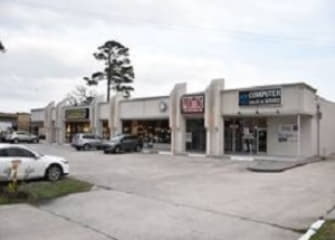Marcus & Millichap (NYSE: MMI), a leading commercial real estate investment services firm with offices throughout the United States and Canada, has announced the sale of The Shops at Champions, a 16,112-square foot retail property located in Houston, Texas, according to Ford Noe, Regional Manager of the firm’s Houston office.
Alex Wolansky and Gus Lagos, investment specialists in Marcus & Millichap’s Houston office, had the exclusive listing to market the property on behalf of the seller, an individual/personal trust. The buyer, a private investor, was secured and represented by Gus Lagos.
The Shops at Champions is located at 6265 Cypress Creek Parkway in Houston, Texas.
About Marcus & Millichap (NYSE: MMI)
With nearly 2000 investment sales and financing professionals located throughout the United States and Canada, Marcus & Millichap is a leading specialist in commercial real estate investment sales, financing, research and advisory services. Founded in 1971, the firm closed 9,472 transactions in 2018 with a value of approximately $46.4 billion. Marcus & Millichap has perfected a powerful system for marketing properties that combines investment specialization, local market expertise, the industry’s most comprehensive research, state-of-the-art technology, and relationships with the largest pool of qualified investors.

A little while back, I wrote about how an emerging new category of workplace alternatives are attracting attention from both the venture community and some of the commercial real estate’s biggest players.
One such company is Austin-based Swivel, which has developed an agile leasing platform and network. The startup just raised $8 million in Series A funding led by Jim Breyer of Breyer Capital (who’s also backed the likes of Facebook and Spotify). Breyer is contributing $5 million of the capital. JLL Spark, the venture arm of commercial real estate brokerage giant JLL, put up the remaining $3 million. The financing brings Swivel’s total raised to $14.6 million, according to its Crunchbase profile.
Swivel raised an $850,000 seed round in 2016 and then another $1 million in June 2017. In 2018, the company brought in another $4.8 million in what Swivel founder and president Scott Harmon described as a Seed 2 round.
The startup has been testing its model across Texas, mostly in Austin and some in Dallas and Houston.
“Everything seems to be proven right and working,” Harmon told Crunchbase News. “So we raised this round to scale up nationwide.”
How it works
Harmon founded Swivel in late 2016 with some initial incubation capital from Floodgate. He and Floodgate Co-Founder Mike Maples had started and sold a software company together in the late 1990s called Motive and decided they wanted to work together again.
They both had a passion for “simplifying the office,” Harmon said and felt like the commercial real estate office market needed to be disrupted.
So how does it work? Pre-qualified member companies can contract with Swivel’s landlord partners for turnkey office space on flexible terms with little or no upfront capital expenditure and no lease lock-in.
Landlords use the company’s agile leasing platform to backstop their leases for member companies. (I wrote about a similar startup, Landing, recently that is focused on flexible apartment leases). Using Swivel, leases are typically a 12-month commitment with a maximum of four years.
Clients are able to use Swivel’s software to configure and design the space however they want; most offices are between 3,000 and 10,000 square feet. Companies need only to give 60 to 90 days notice before moving out and they are not charged any penalties or move-out fees and don’t have to deal with subleasing.
Since its network launch in 2019, Swivel has signed up over 30 landlords representing more than 150 properties across Austin, Dallas, and Houston.
What it is and what it’s not
Harmon is quick to point out that unlike other flexible workspace operators such as WeWork or Knotel, Swivel is not a landlord. It does not lease space.
“We’re more like a VRBO for office space,” he told me. “People who own properties use our technology and platform to lease to new tenants on more flexible terms. Landlords make the money and share their profits with us.”
For example, a landlord can open up two floors in a building specifically to be listed via Swivel. They can charge a (10 to 20 percent higher) price per square foot because of the flexible terms, but it will still come out to about half the cost of a co-working space, Harmon said. The swivel will completely furnish the space, and “the building becomes more valuable,” according to Harmon.
“We work with hundreds of landlords,” Harmon said, “and we allow them to make more money by bringing a different kind of client into their building and providing a new class of service.”
Swivel is also not out to replace commercial real estate brokers, opting instead to partner with them so it saves money on marketing as well. It works out well for all involved, Harmon said.
Looking ahead
Swivel’s target market is tech-enabled companies in their growth phase, which make up about half of the tenants leasing through its platform. (It works with tenants such as Dremio, Graylog, Guideline 401k, hOp, Plivo, Samcart, TalentRobot, and Verify.)
The process is a more appealing one to tech upstarts that simply prefer a more digital process in general.
“They’re just used to the flexibility and that sort of convenience in other parts of their lives,” Harmon said.
But Swivel has also helped a number of multinational companies that require flexibility for their satellite offices.
The company plans to use its new capital primarily to expand across the U.S. in 2020. It is in talks with landlords in Boston, New York, Northern Virginia, Charlotte, N.C., Los Angeles, Salt Lake City, Utah, Denver, and San Francisco.
“Expansion cities are a finite list and expand based on how our landlord partnerships unfold,” Harmon said. “Landlord partners will determine the order and timing of opening up each market.”
For his part, Breyer believes Swivel’s business model is an ideal approach to help landlords be able to meet the evolving needs of tenants.
“As a VC, one of my mantras [to portfolio companies] is ‘don’t sign anything longer than two years,’ ” Breyer told me. “Real estate hasn’t kept up with that, as the leasing business hasn’t yet been tech-enabled, particularly in very important markets, like Silicon Valley and Austin.”
In general, he also believes flexible leases will become more and more important in general given workforce needs.
“The next generation thinks about flexibility first and foremost,” Breyer told me. “Swivel gives landlords the opportunity to attract the tenants of the future.”
Scheduled for completion in spring 2022, the Hewlett Packard Enterprise development will consist of two 5-story buildings located at the southwest corner of East Mossy Oaks Road and Lake Plaza Drive and include 440,000 SF of rentable space.
Located in Spring, this development will house the fourth major corporation to choose CityPlace at Springwoods Village, joining HP Inc., Southwestern Energy and the American Bureau of Shipping.
“Breaking ground on HPE’s campus is another major milestone reinforcing CityPlace as the most important and vibrant, 18-hour mixed-use destination in north Houston,” said Robert Fields, President, and CEO of Patrinely Group, the managing partner of the joint venture. “2019 was a significant year with the opening of ABS headquarters, the HP Inc. campus, Star Cinema Grill, 24 Hour Fitness, and two Class A multi-tenant buildings, CityPlace 1 and 1401 Lake Plaza Drive.”
Pickard Chilton is the design architect; Kirksey is the executive architect; REES is the interior architect; D.E. Harvey Builders is the general contractor. Ronnie Deyo, John Roberts and Beau Bellow of JLL represented Hewlett Packard Enterprises. Dennis Tarro of Patrinely Group, and Chrissy Wilson and Russell Hodges of JLL represented the landlord.
The project will have a parking garage with 2,055 spaces.
CityPlace is a 60-acre mixed-use development providing the growing area along the Grand Parkway corridor near the 3 million-SF Exxon Mobil campus.
When fully developed, the project will include a full-service Houston CityPlace Marriott, 8 million SF of Class A office space with 500,000 SF of retail space and multifamily projects.
The development’s five to 10-story Class A office buildings will offer parking at a ratio of up to 4.5 cars per 1,000 rentable square feet, with spaces located in all structured parking.
CityPlace is the commercial center of Springwoods Village, a 2,000-acre master-planned community, 20 miles north of downtown Houston.
Atlanta-based Stonemont Financial Group recently launched phase one of its 540-acre Southwest International Gateway Business Park in El Campo, Texas, around 60 miles southwest of Houston.
“We have officially closed on the land and completed all of our designs, and we’re in the process of breaking ground as we speak,” Stonemont Financial CEO Zack Markwell told FreightWaves during an interview Wednesday.
The new park, which could house up to 8 million square feet of industrial space, is located along Interstate 69, almost midway between Houston and San Antonio, and about 200 miles from the U.S.-Mexico border.
The first phase of construction will include two warehouses: a 125,000-square-foot distribution center and a 200,000-square-foot speculative warehouse. The park will have full intermodal and transload capabilities once completed in 12 to 15 months, according to Stonemont officials.
Vitro Chemicals, a subsidiary of Monterrey, Mexico-based Vitro, has already signed on as a tenant for the 125,000-square-foot distribution center. Vitro is one of the largest glass manufacturers in the world.
Markwell said another reason they picked El Campo was to capitalize on its location along the Kansas City Southern Railway NYSEKCS.
“We have been working with KCS for the last four to five years in finding the optimal location where we had frontage on their line and then also frontage on I-69,” Markwell said. “All of that is a very strategic location to the Houston market, but also the important markets of San Antonio, Austin, and Dallas.”
KCS’s major hubs include Kansas City, Missouri; Shreveport, Louisiana; New Orleans; Dallas; and Houston. KCS’s Mexico-based affiliate, Kansas City Southern de México (KCSM), operates across northeastern, central, southeast-central and southwest-central Mexico.
Markwell said by connecting the new industrial park to the KCS rail line, Mexico-based manufacturers can use KCS for cross-border shipping from their factories in Mexico, all the way to the park, and closer to major distribution centers in Houston, San Antonio, and Dallas.
Tenants will also benefit from customs preclearance that enables users to bypass rail and highway backups at the border crossing, as well as avoid backlogs of truck and rail traffic at existing regional parks and ports closer to the congested Houston metro area.
“Our manufacturers in Mexico are moving the border north — if you think about it that way — where they are coming from Mexico, coming to Laredo today and then breaking down and either drawing from that point or staying on and switching carriers and going throughout the United States and distributing back into Texas,” Markwell said. “What we’re doing is moving that border north to just 62 miles outside of Houston and serving it from that point.”
The park will also be part of a Foreign Trade Zone (FTZ), with additional local and state economic incentives available for tenants.
Ridgeline Property Group, an Atlanta-based commercial real estate development firm, is partnering with Stonemont to develop Southwest International Gateway, Business Park.
Pittsburg, Kansas-based Watco Companies will operate the short line railroad connecting the buildings to the KCS mainline. Houston-based NAI Partners will oversee leasing at the park.



